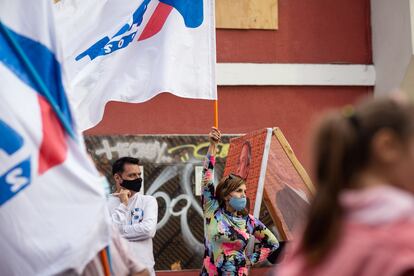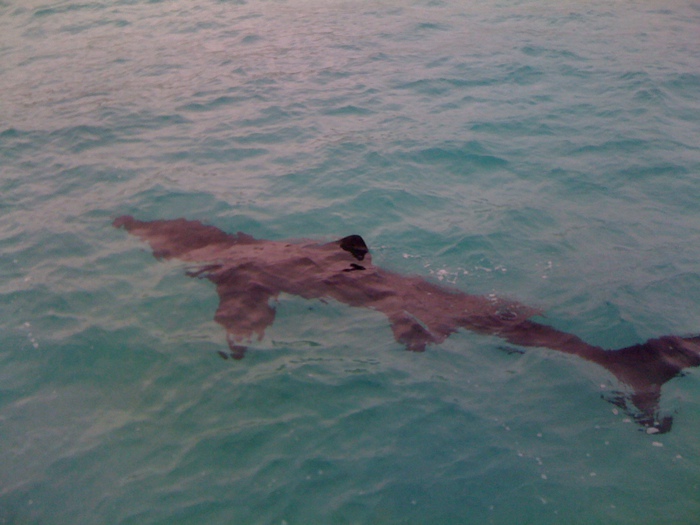"Chile is in danger," said the host of José Antonio Kast's campaign closing in the northern city of Iquique (1,800 kilometers from Santiago) on Thursday. "You have to be very vigilant on Sunday [in the second round of the presidential elections] that if you don't, they will steal our votes," he added before some 200 attendees who wave Chilean flags and that of the Republican Party candidate. During the event, the national anthem is sung, a cueca foot (traditional dance) is danced and every so often someone shouts "Chi-chi-chi, le-le-le, long live Chi-le!" The north of the country is the largest gateway for immigrants through unauthorized crossings. A couple of months ago, Iquique was the scene of an anti-immigrant march that ended with the burning of mattresses and other belongings of homeless Venezuelans who had entered irregularly.
Kast achieved a narrow victory in the Norte Grande in the first electoral round with proposals to control the migration crisis, including the construction of a ditch in a 4,200-kilometer stretch of the border. He also visited Colchane, the small border town with Bolivia that has had more undocumented foreigners than inhabitants (1,600) and in which 19 migrants have died so far this year. Colchane is the first stop in Chilean territory for Venezuelans, who then arrive in Iquique, where they gather enough money for a PCR test of the covid (26.6 euros), a series of documents and a ticket that takes them to Santiago ( 53.2 euros), where most have relatives. During the wait, they blend into the Iquique landscape. Once they are kicked out of the shelters,They sleep in tents on the beach until they are taken out in the early morning, they eat at the foot of the cathedral, they rest from the inclement sun at the bus stops or under the trees downtown.
Makeshift tents for Venezuelan migrants on the coastal edge of Playa de Cavancha in Iquique.Sofia Yanjari
The candidate who nearly snatched the top spot in the north from Kast was not the leftist Gabriel Boric - his opponent in Sunday's second round - but the economist Franco Parisi of the People's Party.
One of the great unknowns for the second round is where the almost million votes (12.8%) that he obtained for third place in the presidential race will go without setting foot in the country.
His good result took political scientists by surprise and since then they have tried to decipher who the voter is for Parisi, an anti-establishment candidate, critical of political parties, living in the United States, who has problems with the law for a millionaire pension debt with her children and who communicates with her followers through the YouTube program Bad boys.
More information
Presidential elections in Chile: the keys to the second round between Boric and Kast
In the north is the mining vote. The arid regions of the highlands are home to copper mines, of which Chile is the world's largest producer. To understand the Parisi voter, the sociologist and professor Bernardo Guerrero, from the Arturo Prat University, argues that we must go back to the late eighties, when the profile of the nitrate miner changed. It happens to be that of an employee who travels in company 4x4 trucks and has a high level of consumption, and his vote is changing, he describes. "It is a population that has no roots in the memory of the north," says Guerrero in his office in Iquique, where he remarks that the north was not "socialist or communist, but allendist." And that, after Augusto Pinochet's coup against Salvador Allende in 1973, when the neoliberal model was installed, changed:"The mining voter in the 4x4 is from the People's Party, not from the people."
A group of followers of the right-wing candidate José Antonio Kast participates in a political rally in Iquique.Sophia Yanjari
“In ideological terms it is a variant of the Independent Democratic Union [far-right], but less white than Kast.
But deep down they come from the same source of belief in self-improvement ”, adds the sociologist.
Juan Carlos, a taxi driver, voted for Parisi.
He liked his proposal to lower the salary of parliamentarians and that "he handles himself with the figures."
He was only concerned that he did not have a strong immigration proposal.
Polls after the first round reveal that the average Parisi voter is male and of low social status.
“They are likely to vote for Kast.
However, another study says that women are more relevant in the popular sectors and that they are being attracted to Boric ”, states the political scientist Claudio Fuentes.
“What will move the vote in the second round is security.
Boric is offering the security of the welfare state and Kast of public order.
That is the dilemma for the Parisi voter: what security does he prioritize?
For Francis Espinoza, an academic at the Universidad Católica del Norte and a doctor in Political Science, what will determine the vote will be economic uncertainty: "The individualistic meritocracy that Parisi managed to collect will surely go with Kast."
Fishermen work in the Port of Iquique Sofia Yanjari
On the northern radio stations, messages from the far-right are heard in which he describes the models among which he considers Chileans should choose: "that of communism and economic stagnation," or that of "order and progress." As soon as the second round events started, both Kast and Boric and their respective teams visited the north. At the end of Boric's campaign, the candidate of the Broad Front in alliance with the Communist Party, also on Thursday afternoon, Fernando Manríquez, a 55-year-old accountant and auditor, and his wife, Nadia Aguilera, a 57-year-old teacher, reproached him not having visited their lands before the first round.
Manríquez attended a Boric event in the Humberstone town, in the Atacama desert, a few weeks ago.
The candidate made a mea culpa, he says, for not having addressed the issue of migration better.
"I heard the north," he said, "we are going to solve the problem," he remembers.
"We are not going to win the north, but we are going to do better," says the couple resigned at the end of the campaign of the leftist, with just over a hundred people.
Subscribe here to the
EL PAÍS América
newsletter
and receive all the informative keys of the current situation in the region.






